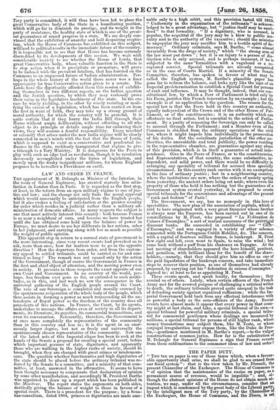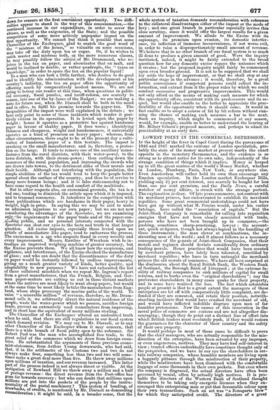THE PAPER DUTY.
"THE tax on paper is one of those taxes which, when a favour- able opportunity shall arise, we shall be glad to see erased from our fiscal system ' : that is the view taken by Mr. Disraeli, the present Chancellor of the Exchequer. The House of Commons is of opinion that the maintenance of the excise on paper, as permanent source of revenue, would be impolitic " ; and, al- though the abstract opinions of the House do not obtain much at- tention, we may, under all the circumstances, consider that an impost which is condemned by the great body of the Liberal partY by the intelligent men of the Tory party, by the Chancellor 01 the Exchequer, the House of Commons, and. the Times, is set down for erasure at the first convement opportunity. Two diffi- culties appear to stand in. the way of this eonsummation,—the continued increase in our expenditure, in order to cover the abuses, as well as the exigencies, of the State ; and the possible competition of some more actively unpopular impost on the first opportunity. We cannot but think it possible that some Chancellor of the Exchequer, ,glad to snatch the good word of the "mistress of the .pouse,' so valuable on some occasions may take off the duty upon tea or sugar. Or, if he wishes tO catch master and mistress both, os the more numerous classes, he may possibly follow the advice of Mr. Drummond, who re- joices in the tax on paper, and abominates that on malt, and would be inclined to double, or rather quadruple the "taxes on knowledge," in order to spare the tax on the popular liquid !
To a man who can look a little farther, who desires to do good and to identify his administration with the development of his
country's induStry, the tax on paper offers the opportunity of
effecting much by comparatively modest means. IVO are not going to betray our reader at this time, when questions in politi- cal economy, fiscal puzzles, and tariff-reform, are scarcely in season, into one of the by-lanes of the Budget; we are making a note for future use, when Mr. Disraeli shall be both in the mind and in office, to fulfil his promise towards the paper-tax. The inequalities of the impost were well explained in the debate ; we here only point to some of those incidents which render it posi- tively vicious in its operation. It is levied upon the paper by weig t ; hence it operates as a protective tax against handsome paper in favour of shabby paper. It does worse ; identifying thinness and, cheapness, weight and handsomeness, it universally operates as a kind of premium on heavy paper; whereas, from other circumstances, there ought to be at the present day a culti- vation of handsome paper of a thin texture. The impost is crushing on the small manufacturer, and is, therefore, a protec- tion on the large. It tends to remove one of the auxiliary manu- factures from the rural districts, with their water-power, to the town districts, with their steam-power ; thus cutting down the resources of the rural population, and increasing the crowds who are drawn into towns, to the detriment alike of their morals and their health. Although not interfering with the population, the simple abolition of the tax would tend to keep the people better spread about the surface of the country, and thus be of service to many more human beings ; and it is false statesmanship not to have some regard to the health and comfort of the multitude..
But in other respects also, on economical grounds, the tax is a bad one, tending to diminish the article upon which it is imposed, and to trammel commerce. It interferes in the competition with those publications which are handsome in their paper, heavy in weight, high in price. In saying this we may he said to make an admission injurious to our own. paper ; but we are not now
considering the advantages of the Spectator, we are examining
o r---the requirements of the paper trade and of the paper-con- Are.aLg public, and no personal interests connected with the
Spectator can shut our eyes to the facts and truth in that larger question. All excise imposts, especially those levied upon an
article of manufacture like paper, tend to embarrass the process. The exciseman is a spy who suspects fraud in every novelty and every improvement. Messrs. Rawlins of Wrexham wish to in-
troduce an improved weighing machine of greater accuracy, but the Excise prevents them. We all know how the suspicions, and vigilance, and interference, of the Excise checked the manufacture of glass ; and who can doubt that the discontinuance of the duty on paper would be instantly followed by endless improvements, ) giving us a much greater variety of kinds, better quality, and adaptability to new purposes ? We have not exhausted the list-
of these collateral mischiefs when we repeat Mr. Ingram's report from a great manufacturer, that the French, Belgian, and Ger- man paper-makers are cutting us out in those distant markets where the natives are most likely to want cheap papers, but would at the same time be most likely to take the manufacture from Eng- land, whose ships preoccupy the marine paths of the world. To raise "a miserable million" of revenue, therefore, as Mr. Drum- mond calls it, we arbitrarily divert the natural residence of the people, waste the water-power which we possess, sacrifice foreign trade, prevent an extensively used manufacture from improving, and in short lose the equivalent of many millions sterling. The Chancellor of the Exchequer uttered an undoubted truth when he said, that there are still regulations in our fiscal system
which demand revision. We may say, to Mr. Disraeli, or to any
other Chancellor of the Exchequer whom it may concern, that there is a wide branch of fiscal polity open to the reformer. Sir Robert Peel was the man who accomplished free trade, to the great relief of the commerce which we draw from foreign coun- tries. He substantiated the arguments of those previous econo- mist-statesmen, from Arthur Young downwards, who had said, that, if in the arithmetic of the Customs two and two do not always make four, something less than two and two will some- times make a great deal more than five. He threw away millions Upon millions of taxation, and our revenue increased. This latter part of the process indeed is not always direct or visible. At the instigation of Rowland Hill we threw away a million and a half of postage revenue : the direct revenue from the Post-office has gone far towards recovery; but who can doubt that millions upon
millions are put into the pockets of the people by the instru- ipentality of the postal machinery ? This system of bonding, of drawbacks, of credits, is mentioned by Mr. Disraeli as demanding reconsideration, it might be said, in a broader sense, that the whole system of taxation demands reconsideration with reference to the collateral disadvantages either of the impost or the mode of levy ; and one great branch in particular especially invites this close scrutiny, since it would offer the largest results for a given amount of improvement. We allude to the Excise with its espionage, its premium upon evasion, its domestic interfer- ence its infliction of immense inconvenience, if not worse evil, in order to raise a disproportionately small amount of revenue. We believe that in no other branch of our fiscal system is so much ill done to produce a given amount of good. Were the inquiry instituted, indeed, it might be fairly extended to the broad question how far any domestic excise repays the nuisance which it creates ; but the proposed inquiry might fairly be commenced upon even broader ground. It is not to be supposed that we shall lay aside the hope of improvement, or that we shall stop at any particular stage in the advance; • it would, therefore, be a great public convenience if competent persons could collect the in- formation, and extract from it the proper rules by which we could conduct successive and progressive improvements. This would not only afford us the means of making each measure for which the opportunity offers, consistent with its predecessors and its se- quel, but would also enable us the better to appreciate the prac- ticability of the opportunity when it should come. It would in fact enable us to adopt a course of bit by bit reform without run- nins. the chance of making each measure a bar to the next. Such an inquiry, which might be commenced at any season, would, for example, enable us better to understand the bearing of Mr. Milner Gibson's proposed measure, and perhaps to admit its practicability at an early date.



























 Previous page
Previous page